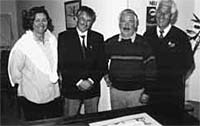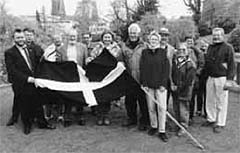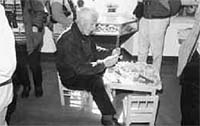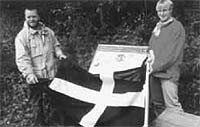|
|
||
|
In March and April this year the Trust and its counterpart in Germany - the Lower Saxony branch of Naturschutzbund Deutchland (NABU) - signed official twinning documents in Marazion and Oldenburg, respectively. Extracts from the speeches at Marazion are presented here to give a feeling for the nature and aspirations of our partnership. "I hope our German friends - and Heike and Rudiger in particular - will not mind if I begin with a romantic story. In 1996 they visited Cornwall and fell in love with the Cornish countryside. They visited the shop in Penzance where alert and long- standing members Roy and Lucinda Cattran, recognising that these were not a couple of ordinary visitors, directed them to Sally Hawkins who soon told them about the Trust. Their interest in the Trust grew. Such is their commitment to Cornwall - and its natural habitat - that when Rudiger and Heike married they put together all their monetary wedding presents and invested them in the management of one of our reserves - Kemyel Crease, between Mousehole and Lamorna. And you may know, they came here to spend their honeymoon in Cornwall. The branch of NABU that Rudiger directs is in the area of Oldenburg, which has a North Sea coastline bordering the German Bight. In Cornwall we have less land and more coastline than you. Our memberships are similar, with a strong youth group equivalent to our Fox Club. But it is our shared mission that is of paramount importance. The parallel aims became clear to you in NABU and - from your links first with Sally and then with Howard Curnow - the idea of twinning has grown and taken root. Your love of wild Cornwall is naturally one we share - and, given that you live on the other side of the North Sea, is one we admire. We congratulate you on your commitment and welcome your initiative. Now to the twinning of the Cornwall Wildlife Trust and the Lower Saxony branch of NABU. The document we are going to sign is a statement of intent to act together, to share our membership and our experience. |
||
 Signing the twinning document in Germany. L to R: Jane King (our Council Chair and Vice- president); Olaf Tschimpke (Director, NABU Lower Saxony); Rolf Grösch (NABU Council Member); Howard Curnow (our Council Vice- chair).Photo: Stuart Hutchings |
 Members and staff of both organisations met in Oldenburg earlier this year to cement our growing relationship. Photo: Stuart Hutchings |
|
|
It is a commitment to actually do something together, primarily in the interests of conserving our vanishing habitat and wildlife. This will be done by exchange visits and shared activities, particularly involving our younger members. Education of the young must go hand in hand with conservation. We must never forget that we have not inherited the wealth of wildlife we enjoy from our parents - we have borrowed it from our children. The Torrey Canyon in 1967 devastated marine life around these shores and we have been asking ourselves whether we would be better prepared if it were to happen again. This is a threat to all coastlines these days. We are bringing together the work of the Trust with an EU Project - The Atlantic Living Coastline - and expertise on oil pollution from our regional research laboratories, in order to be better prepared. We are keen to share that knowledge and experience with you - and I hope this can begin during your visit. But there are new and important longer- term threats that together threaten our missions - you in Lower Saxony and we here in Cornwall:
So we must share what we know - and what we learn - in order to help each other. Twinning will help that. There has been a renaissance in environmental values and thinking over the last decade. It was Petra Kelly and the green movement in Germany who showed the world what could be achieved politically. And we must not decry the fact that other parties then stole their agenda - the environment has benefited. We should share our thinking and not be too possessive about our initiatives. Twinning is one step towards co- operation and collaboration in a world beset by competition and conflict - let's make it work!" Tony Stebbing |
||
|
"It is a great honour for me and my colleagues from Lower Saxony to sign this document of twinning between the Cornwall Wildlife Trust and NABU Lower Saxony. With this document we want to certify that our partnership and co- operation, which has existed successfully for four years now, shall have a future and a common basis and be a house to live in for all the enthusiasts who love wildlife in both of our European regions. In these days politicians of both countries always speak about the "Europe of the regions". But - please let me express this in a clear and open way - we feel that they speak and think about their "Europe of the regions". So from our viewpoint of natural protection and conservation of cultural identity it is necessary to foster all projects and work which have the aim of avoiding a Europe with regions which all look similar, with the same intensive agriculture, with the same high density of hens and cattle and maize, with the same mixture of chain stores in pedestrian zones - the same loss of identity. We feel that the projects of the Cornwall Wildlife Trust are working powerfully and successfully against the loss of identity. A very impressive example of this wonderful work is your Habitat Appeal with which you try to save the key habitats of the Duchy. It is impressive to us for two reasons: you are constructing a network of the crown jewels of nature in Cornwall and you are involving your members, volunteers and the population. So we wish you ongoing good success! We think that there are a lot of similarities between our organisations: the care for self- run reserves; voluntary activities in conservation in different fields; environmental education, in particular for children (our future and the politicians of the next century); lobbying for nature and better environmental legislation; running special projects, for example for bats and marine life; supporting local groups and much more. Also - and we are lucky to be able to say this - both organisations have increasing memberships, and if we focus on the percentage of the increase you are very, very successful! Congratulations on this success. As a very old organisation - NABU Lower Saxony is 52 years old and NABU in Germany exactly 100 years - we know how hard it is to continue recruiting members. We're hopeful that we'll reach the member number 50,000 in Lower Saxony before the millennium. And I should not forget to say that the re- establishment of NABU in Lower Saxony was made possible thanks to a British officer in 1947 - one more link to Britain... |
||
 Howard Curnow and the rest of our visiting party were impressed by the imaginative educational resources of NABU's visitor centre. Photo: Stuart Hutchings |
|
|
|
But let us have a look into the future. The exchange of staff and volunteers is progressing well. I think the most important point and target of our co- operation should be to bring volunteers together, of every age, of every background, of every profession. Our volunteers are our capital. Our volunteers are the leaves of the tree whose name is conservation, and we should consider ourselves to be the branches that hold them and who benefit from the "work" of the leaves; of the leaves which feel both sunshine and shadow, warm days and dark nights. Also the exchange of young people should be greatly strengthened. We should also foster our co- operation in the European field. A good example for co- operation would be a common project for a seminar on avoiding oil pollution in the sea and working towards greater safety of shipping. As you know, we recently had a big disaster caused by a vessel in the North Sea, just some weeks after Howard Curnow and Rudiger Wohlers decided that there was a big need to work on this matter - quite an irony ... So, there is a lot to do, and a lot to continue, but let's keep optimistic. Let's go on, and feel a little "married" now - married to a partner in Lower Saxony, between the dunes of the East Friesian Islands in the North Sea and the high Harz Mountains, which is proud to have a strong partner in sunny Cornwall and is hopeful for success in our common aim, the conservation of wildlife." Olaf Tschimpke Our twinning with NABU is a source of inspiration, practical assistance and pleasure. To make the most of all it offers we need more members to become actively involved. Please give us your views on the partnership and your ideas for its advancement. If you are interested in taking part in joint activities, here or in Germany, please let Trust HQ know. |
||
